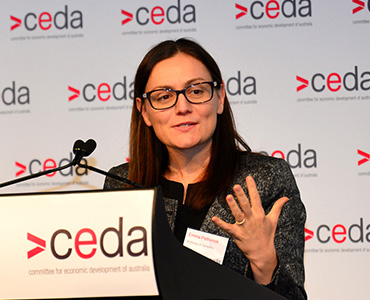When you pit human experts against the sheer power of data and machine-based analysis, more often than not the machine can outperform the human, McKinsey & Company Partner, Emma Petherick said at the CEDA QLD CEO panel on future leadership.

“In future, the question or the archetype for where human labour adds value to machine-based labour becomes quite different from where it is today.
“That will have to lead to quite a significant restructuring of what an organisation looks like and how we piece the bits of an organisation together.”
Ms Petherick said four characteristics are going to become disproportionately more important for our leaders of today and tomorrow.
“The first is a shift from technical leadership to adaptive leadership,” she said.
“Where technical leadership is what’s called for when you have a known problem to solve or an unknown problem to solve but a familiar path to solving that problem.
“Contrast that with adaptive leadership, which is leadership that’s required when you’re in the space of a totally unfamiliar problem and there’s no clear path to solving that problem.
“Where the leader adds value by facilitating and actively drawing out diversity by being quite willing to make big shifts of resources from one part of an organisation to another without the bank of evidence that might have been available in the past.”
Ms Petherick said the second characteristic of future leadership is moving from single sector leadership focused to tri-sector leadership focused – public sector, private sector and social sector.
“Increasingly both the opportunities and the threats for an organisation will cut across the boundaries of all three sectors,” she said.
“They’ll be an increased premium on the need for leaders to be able to articulate the social or the public value of their organisation, not just the shareholder value.
“Linked to that is the third characteristic, the increasing need for leaders to have a compelling narrative and vision for their organisation.”
Ms Petherick said the final characteristic is creating leadership roles that are sustainable for the individual over significant periods of time.
“It is an absolute necessity for leaders to manage their own energy and their own wellbeing,” she said.
“This job is getting far more physically demanding and far more emotionally demanding on the individuals involved.
“Whether it’s the sheer geographic travel, the jetlag involved, the 24/7 availability, the increased frequency of internal and external crisis that need to be responded to and just the sheer level of scrutiny with the increased levels of transparency.
“We need leadership roles to be appealing.”
Hesta Chief Executive Officer, Debby Blakey said in order for the leaders of tomorrow to be successful they need to be skilful in delivering vision and purpose.
“It’s no longer about cascading process and structure down into an organisation,” she said.
“I think it’s very much about leadership and having tremendous purpose.”
Ms Blakey said there was a need to support the informal leadership within an organisation.
“We speak a lot at my organisation about every one of us being a leader,” she said.
“The thing I love most is when you see that incredible informal leadership, somebody is seeing a gap and standing up and taking leadership.
“I’ve been in the role for two and a half years and have realised it’s not all up to me, or my executive team, we’ve got a whole organisation of people who actually want to take that step forward.”
Westpac Managing Director and Chief Executive Officer, Brian Hartzer said leaders today and into the future need to focus on the importance of people.
“Business is not just a conceptual activity, it’s not just an academic activity, you’re actually dealing with human beings who have choices about how they spend their lives and the level of engagement of what they bring to what they do,” he said.
“As a leader, you need to spend a lot of time thinking about how to create an environment where the best people want to be, and where the best people can do their best work,” he said.
Mr Hartzer said Westpac are already thinking about what a career within their organisation looks like in the future.
“We already have around 30 per cent of our staff work contractually or on projects, it’s something that we’re grappling with more and more,” he said.
“We’re going to have to think differently about the processes of the systems for managing people’s careers within companies.
“I like to make the observation that a lot of companies are run using a structure that was created in the 19th century for the British to run India, and yet we’re in a dynamic iPhone world where people move around.
“We certainly need to think differently about the rotation and development of people’s skills and career paths through a company, which we are doing in a variety of ways.”
Hastings Deering Chief Executive Officer and Managing Director, Dean Mehmet said future leaders will need the ability to adapt to a rapidly changing marketplace.
“Fundamentally when it comes to strategy we’re now finding that we’re probably needing to have multiple choices because markets change,” he said.
“There’s been a lot of change in the last few years and to be able to quickly adapt means engaging more of the organisation.
“It’s more about letting our people know why, as leaders we tend to talk about what we want to do and how we want to do it, but not really why.
“The more people understand the why, the easier it is to be adaptive when changes occur in the marketplace.”